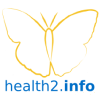 health2.info is a Web 2.0 Health Information and news interchange and publication tool for Health professionals. The objective is to provide information about Healthcare relevant stories that users found around the internet.
health2.info is a Web 2.0 Health Information and news interchange and publication tool for Health professionals. The objective is to provide information about Healthcare relevant stories that users found around the internet.
health2.info whishes to establish a social web (web 2.0) about Healthcare on different health interests groups (management, technology, public health, medical research, etc.), where there is a lot of knowledgement, news and interesting projects but mostly of them are dispersed all around.
health2.info is not a scientific magazine or publication; its simply a self generation content platform based on news and founds on the internet related to Healthcare. Its an internet site that allows moving news that will be reviewed by all the community and rest of users and will be, or not, promoted to main page. When a user sends a news or story, this will remain in a pendent queue until it gets enough votes (or prescriptions) to be moved to the home page.
Best participants and valuated users are better seeing into the community (by using the karma concept). The news that will be publicized into the main page are the ones that receive more votes (or prescriptions) by the community, so no editors or reviewed; pure web 2.0 platform.
Two relevant things that differentiate health2.info from others news or health information sites:
1. Web 2.0, Social self generated content internet site, related to Health which, from this the health2.info part of the name.
2. Stories and news can be in several languages (English and Spanish already and being translated to German, French and others)
That makes health2.info the first Health 2.0 news and story information share system participated and maintained by users.
For further information, please visit:
http://health2.info